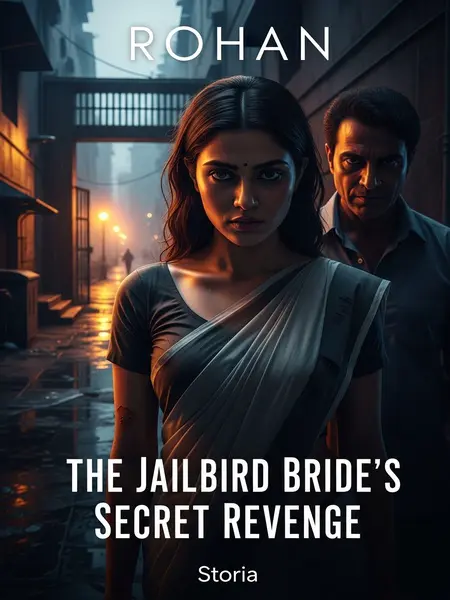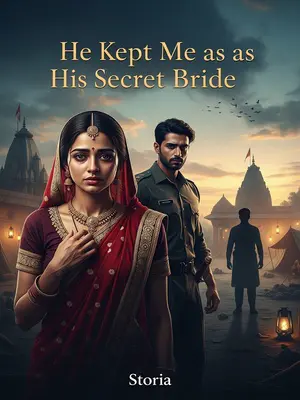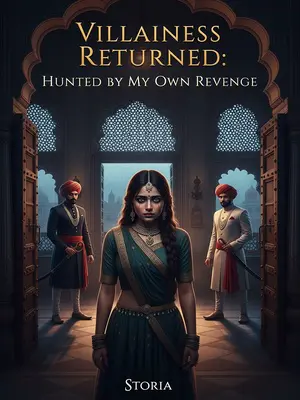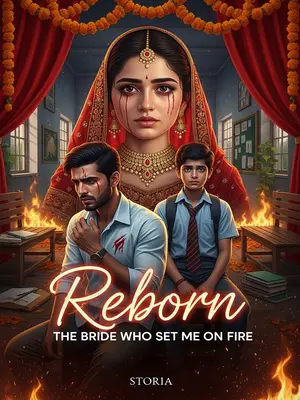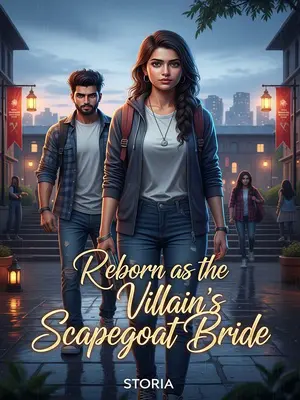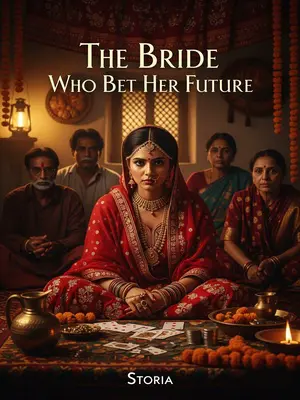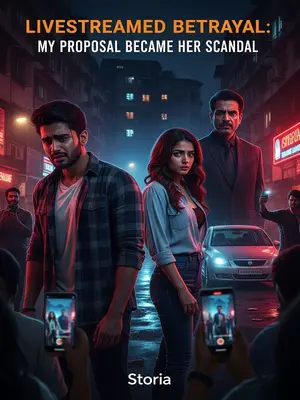Chapter 7: The Cousin’s Crew
When I woke, I was in my own bed.
My head throbbed, mouth dry as sandpaper. For a moment, I wondered if it had all been a dream.
Damn!
The realisation hit me like a slap. I sat up, heart racing. Had Babloo...? I scrambled out of bed.
Ignoring my pounding head, I rushed out.
I stumbled into the hall, almost tripping over the corner of the carpet. The kitchen light was on, the smell of food wafting towards me.
Meera was there, just as before, fussing over the food.
She hummed to herself, a soft tune I couldn’t place. Her hair was braided, her face calm. The sound of her bangles was comforting.
I grabbed her arm, urgent:
"Did Babloo do anything to you last night?"
I spoke too harshly, my grip leaving a mark on her skin. She stared at me in confusion.
She looked at me, confused.
Her eyes widened, searching my face for answers. "Kya hua? Sab thik hai na?"
"No, he brought you back and left. What’s wrong?"
She shook her head, voice steady. "Aap hi ko laye the. Khud chale gaye. Koi baat nahi hui."
I stared at her, finally relaxing.
A wave of relief washed over me. I let go of her arm, ashamed of my panic.
"Nothing. Let’s eat."
I forced a smile, pushing aside my doubts. Meera set a plate in front of me, her movements graceful.
This time, she’d made fish curry. The cuts on the fish were perfectly even, as if drawn with a ruler.
The curry was fragrant, the fish melting in my mouth. I glanced at the pieces, each one identical in size and shape.
For a moment, I remembered what Babloo said. Was he lying, or had Meera really...
I tried to dismiss the thought, but it lingered, stubborn as a stain.
I glanced at her—her eyes were still innocent, her face calm.
She offered me more rice, smiling. Her innocence seemed genuine, but I couldn’t shake my unease.
After eating, I got a call from my cousin, asking me to come over.
The phone buzzed in my pocket. My cousin’s name flashed on the screen—a name that always brought equal parts excitement and dread.
I told Meera not to go anywhere and hurried out.
"Main thodi der mein aata hoon. Kahin mat jaana," I instructed, my tone firmer than usual. Meera nodded, clearing the table.
On the way, I noticed Babloo’s door—his slippers were gone. Who knows what he was up to.
The corridor was silent, the door slightly ajar. A faint smell of rum drifted out. I hurried past, unwilling to linger.
I didn’t care, and drove to my cousin’s place.
I gunned the Maruti through the afternoon heat, sweat trickling down my back. Radio Mirchi played a cheesy remix, the city outside blurring past the window.
He’s my mentor—the one who taught me to pick up women at jail gates. He has a whole crew doing the same thing.
He was a legend in our world—a man who could charm the skin off a snake, who taught us to spot weakness and exploit it. In his living room, a portrait of Sai Baba watched over us all.
We gain the women’s trust. When we’re tired of them, we hand them over to him.
It was a well-oiled machine. I brought the fresh faces, he handled the rest. Each transaction felt less human, more like a business deal.
He sends them abroad. What happens after, he never says—but judging by his growing fortune, it can’t be good.
I’d heard whispers—brothels in Dubai, sweatshops in Malaysia, missing persons reports that went nowhere. But the money was good, and my conscience was weak.
He always says: women just out of jail with no family or friends are like nameless weeds. No one cares if they live or die.
He once told me, "Behen, yeh jail-wali ladkiyan toh kachra hai. Society ko bhi koi farak nahi padta."
Even if they’ve turned over a new leaf, most people still see them as scum, a burden to society.
They are marked forever, their past clinging to them like the stains on their shawls. No matter how hard they try, no one lets them forget.
We get rid of them—it’s almost a good deed.
He’d joke, "Hum toh seva kar rahe hain, bhai. Kachra hata rahe hain sadak se." I used to laugh. Now, the joke felt hollow.
After each woman, he pays me. Others blow the money, but I save it, hoping to buy a house, have a real home.
I dreamed of a two-bedroom flat in Gomti Nagar, a fridge full of cold drinks, a wife who never asked questions. Someday, maybe.
To avoid suspicion, my cousin’s base is at a scrapyard outside the city. After strict checks, I met him in the back office.
The guard checked my pockets, patted me down, then waved me through. The office was filled with the smell of diesel and rusted metal, a battered table in the centre.
He gave me a bear hug, slapping my shoulder.
"Arrey, Rohan! Kya maal laya hai is baar!" he boomed, his gold rings flashing in the light. He always hugged too hard, as if trying to squeeze secrets out of me.
"Not bad, I heard you picked up a real beauty this time."
He grinned, eyes twinkling with mischief. "Picture bheji thi Babloo ne—wah, kya chehra hai!"
He wore a starched white kurta, gold rings flashing as he counted his notes. His accent was pure Awadhi.
I lit a cigarette and grinned.
I blew a ring of smoke, trying to appear casual. "Bas, bhaiya. Aap ke liye toh kuch bhi."
He eyed me, smirking.
He leaned forward, elbows on the table. "Toh, kaam ho gaya ya abhi bhi try maar raha hai?"
"So, have you had her yet?"
He waggled his eyebrows, waiting for my answer.
I lowered my head, embarrassed. He laughed and punched my shoulder.
"Useless!"
His laughter shook the room. He slapped my back, almost knocking the breath out of me.
He pulled out a small glass vial, tossing it to me—a pill inside.
It landed with a soft thud on the table, rolling towards me. The pill glowed pale blue in the afternoon light.
"Tonight, slip this to her. She’ll be dead to the world—you can do whatever you want."
He winked, voice low. "Ek dose mein sab kaam ho jayega. Phir, apni marzi."
I hesitated, and he glared.
His eyes hardened, the smile disappearing. "Kya ho gaya? Dar gaya kya?"
"What, scared she’ll call the cops?"
He leaned in, voice cold. "Yahan sab apna hi khel hai. Kisi ko farak nahi padta."
I handed the bottle back.
I shook my head, trying to hide my trembling hands. "Nahi bhaiya, zaroorat nahi hai. Apne aap aa jayegi mere paas."
"Thanks, bhaiya, but I want her to climb into my bed on her own."
He gave a sharp laugh, then clapped me on the back again. "Teri marzi, Rohan. Bas jaldi nipta."
He gave me a thumbs-up.
He raised his hand, gold rings glinting. "Bhai, tu bhi kamaal hai. Lekin yaad rakh—teen din ke andar maal chahiye."
"Not bad. But hurry up—I need her soon. Have your fun, but bring her to me in a few days."
His tone brooked no argument. I nodded, stuffing my hands in my pockets, itching to leave.
I nodded and left.
The scrapyard gates clanged behind me. I drove back, the city lights flickering on as dusk fell.
On the drive home, I felt a little down.
Even the FM radio seemed sad, playing old Ghazals. I tapped the steering wheel, thinking of Meera’s laughter, the way she looked at me with trust.
To be honest, I liked Meera. I didn’t want to hand her over so soon.
For the first time, I wondered what would happen to her after she left my flat. I tried to imagine her alone, afraid, in a strange country. The thought made my chest ache.
But I had no choice. People who cross my cousin end up dead.
I’d seen it happen—a man found floating in the Gomti, another run down by a truck. No one ever found the bodies. No one ever asked questions.
I don’t want to die. So Meera has to go.
My dreams of a better life were built on the bodies of women like her. I told myself it was just business, nothing personal.
At my door, I felt a chill. The lighting in the flat was bad—even during the day, I had to keep the lights on.
The bulb in the corridor flickered, insects swirling around it. The building was silent, too silent. My heart thudded with dread.
But now, the window was pitch black.
The curtain was drawn, blocking out even the faintest light. A strange, heavy silence pressed against the door.
Had Meera run away?
My mind raced—had Babloo scared her off? Had she discovered my secret and escaped?
Panicked, I fumbled for my keys and unlocked the door.
My hands shook, the key scraping against the lock. Sweat dripped down my back as I finally turned the knob.
The lights came on—and the scene inside made me cry out in terror.
The living room was transformed—furniture overturned, shadows dancing on the walls. A thick, metallic smell filled the air. My heart slammed against my ribs. In the metallic stink and upturned shadows, I realised—I was no longer the one in control.
